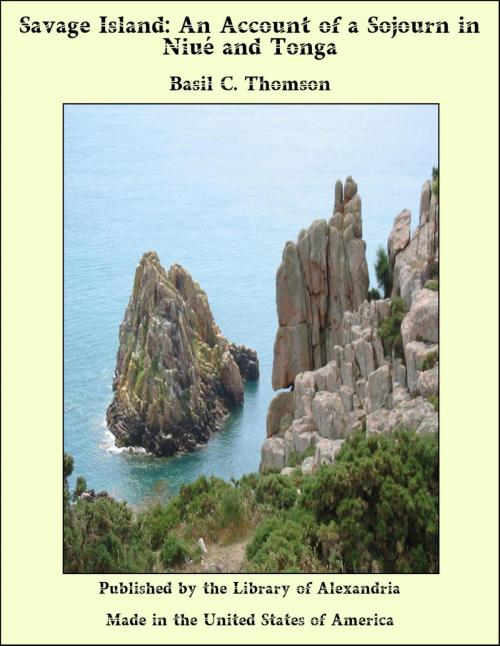Savage Island: An Account of a Sojourn in Niué and Tonga
Nonfiction, Religion & Spirituality, New Age, History, Fiction & Literature| Author: | Basil C. Thomson | ISBN: | 9781465583154 |
| Publisher: | Library of Alexandria | Publication: | March 8, 2015 |
| Imprint: | Language: | English |
| Author: | Basil C. Thomson |
| ISBN: | 9781465583154 |
| Publisher: | Library of Alexandria |
| Publication: | March 8, 2015 |
| Imprint: | |
| Language: | English |
NIUÉ, more commonly known as Savage Island, lies 1,000 miles N.N.E. of New Zealand, and 300 miles S.S.E. of Samoa, in the loneliest spot in that part of the Pacific. Its iron-bound coasts tempt no vessels to call for supplies. At rare intervals great four-masted timber-ships pass in the offing; more rarely still schooners call to replenish the stock of the traders and to carry away their copra. I went to the Niuéans in the name of the Queen and Empress whom the world is still lamenting, and I do not like to think of what our loss means to the people in these remote outposts of her Empire. The oldest native in the South Seas remembers no sovereign's name but hers. She was a real person to them all; a lady who had made them her especial care, had sent the gospel to them, and had bade them lay aside their clubs, and live in peace, order, and equity. Vika, as they called her affectionately—Vika, after whom they named their girl-children—was the benign, all-powerful chief, whose house was built upon the coral strand of Lonitoni (London), opposite the landing-place, where her men-o'-war were moored stem and stern in rows before her door. She read their letters with her own eyes, and had her captains to sit before her on the floor-mats while she gave them messages for the brown folk in far islands. And now Vika, the well-beloved, has left them, mourned by the empire of which they were but the tiniest part. It was hers, and she never saw it; but we, who have seen it—who have, in the humblest way, helped in the making of it—think with heavy hearts of how much hangs upon a name, and of how hard it will be to reassure them, when, as they say of their own dead kings, "kuo hala 'ae langi"—"the heaven has fallen."
NIUÉ, more commonly known as Savage Island, lies 1,000 miles N.N.E. of New Zealand, and 300 miles S.S.E. of Samoa, in the loneliest spot in that part of the Pacific. Its iron-bound coasts tempt no vessels to call for supplies. At rare intervals great four-masted timber-ships pass in the offing; more rarely still schooners call to replenish the stock of the traders and to carry away their copra. I went to the Niuéans in the name of the Queen and Empress whom the world is still lamenting, and I do not like to think of what our loss means to the people in these remote outposts of her Empire. The oldest native in the South Seas remembers no sovereign's name but hers. She was a real person to them all; a lady who had made them her especial care, had sent the gospel to them, and had bade them lay aside their clubs, and live in peace, order, and equity. Vika, as they called her affectionately—Vika, after whom they named their girl-children—was the benign, all-powerful chief, whose house was built upon the coral strand of Lonitoni (London), opposite the landing-place, where her men-o'-war were moored stem and stern in rows before her door. She read their letters with her own eyes, and had her captains to sit before her on the floor-mats while she gave them messages for the brown folk in far islands. And now Vika, the well-beloved, has left them, mourned by the empire of which they were but the tiniest part. It was hers, and she never saw it; but we, who have seen it—who have, in the humblest way, helped in the making of it—think with heavy hearts of how much hangs upon a name, and of how hard it will be to reassure them, when, as they say of their own dead kings, "kuo hala 'ae langi"—"the heaven has fallen."















